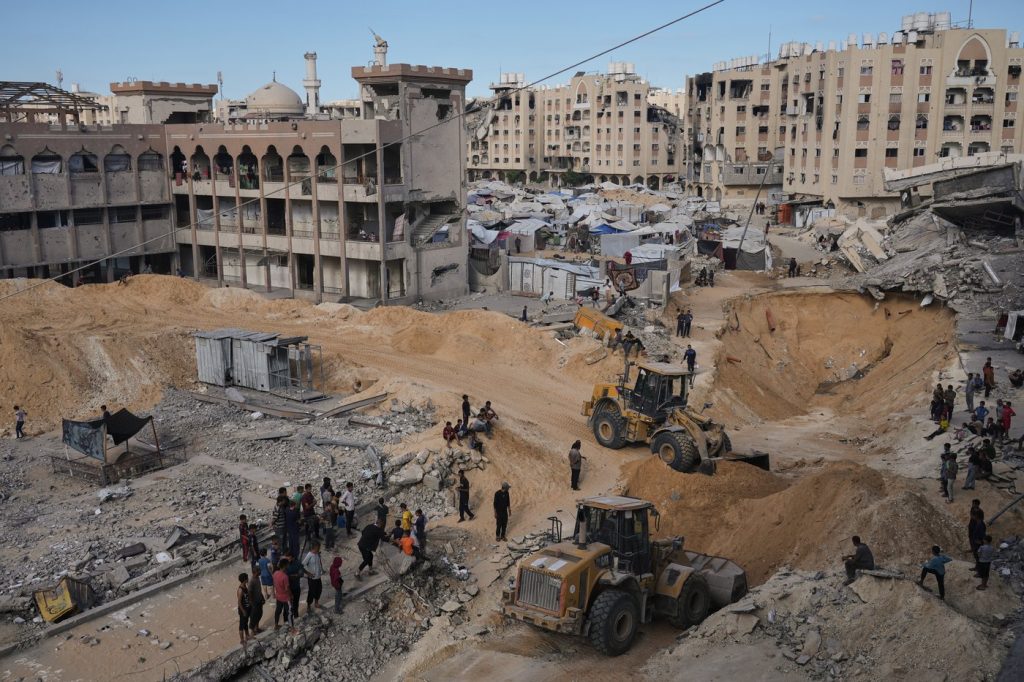CAIRO (AP) – Israel announced that Hamas handed over "two coffins of deceased hostages" from Gaza late Saturday. This development comes as Prime Minister Benjamin Netanyahu intensified pressure on Hamas to expedite the release of the remaining hostages under the ceasefire agreement. The identities of the deceased were not disclosed, but the bodies have been transferred to Israel's National Institute of Forensic Medicine.
Earlier on Saturday, Israel declared that the Rafah crossing, Gaza's only outlet to the outside world, would remain closed "until further notice," linking its reopening to Hamas's return of the remains of hostages. Previously, Israel had indicated that the crossing might reopen on Sunday. Currently, Hamas has delivered the remains of 12 out of 28 deceased hostages, marking a crucial phase in the week-old ceasefire aimed at concluding two years of intense conflict.
Netanyahu's office stated that the Rafah crossing closure coincided with a declaration from the Palestinian embassy in Egypt, which announced that it would reopen on Monday for individuals returning to Gaza. Hamas criticized Netanyahu's decision as a breach of the ceasefire agreement. The Rafah crossing has been shut since May 2024, when Israel gained control of the Gaza side, making its full reopening essential for Gazans seeking medical care, travel, or family visits in Egypt.
Families on both sides are filled with anxiety regarding the remains of the deceased. Israel has been returning bodies of unnamed Palestinians, cataloged only by numbers, while Gaza's Health Ministry has been publishing photos online to encourage families to identify their loved ones. A tearful Iman Sakani expressed her anguish, calling for the return of her son, who went missing amid the conflict, as families gathered at Nasser hospital, anxiously awaiting news.
As part of the ceasefire arrangements, Israel returned 15 bodies of Palestinians to Gaza on Saturday, totaling 135 bodies returned to date. Meanwhile, the toll in Gaza has worsened, with recently recovered bodies pushing the Palestinian death count above 68,000, according to the Health Ministry, which operates under the Hamas-led government. The ministry has been criticized for not distinguishing between civilians and combatants in its statistics, yet it maintains that its casualty records are generally reliable.
The conflict, which reignited on October 7, 2023, was triggered by an attack from Hamas militants, resulting in the deaths of approximately 1,200 people in Israel, the majority of whom were civilians, and the abduction of 251 individuals. Recently, the Israeli authorities identified the remains of a 10th hostage, Eliyahu Margalit, a 76-year-old who was abducted from kibbutz Nir Oz during the initial attack.
U.S. President Donald Trump has warned of potential military action against Hamas should it fail to return the remains of all deceased hostages. Despite Hamas's assertions of commitment to the ceasefire, it has pointed out challenges in recovering remains due to unexploded ordnance in the devastated territory.
Furthermore, the U.S. State Department recently cited credible reports of a planned attack by Hamas against Gaza residents. They emphasized such actions would violate the ceasefire agreement and jeopardize the progress made through mediation. The guarantors of the ceasefire have demanded that Hamas adhere to the terms set forth.
The Israeli organization supporting families of the abducted has pledged to maintain weekly rallies in Tel Aviv until all hostages are returned. Activist Ifat Calderon, whose nephew was freed, expressed the collective desire to avoid further conflict while appealing for the safe return of all captives.
Aid access to Gaza continues to be severely limited as Hamas has urged for expanded humanitarian assistance amidst ongoing closures and Israeli restrictions on aid organizations. U.N. officials have noted that vast areas of Gaza resemble a wasteland, exacerbating the dire humanitarian situation.
As of Friday, records indicated that 339 trucks had been discharged for distribution in Gaza since the ceasefire commenced, falling short of the anticipated 600 trucks per day. The Israeli defense body overseeing Gaza-related aid claimed to have allowed sufficient food supplies while accusing Hamas of misappropriating resources—a claim denied by U.N. and other humanitarian agencies.
Relations remain tense as Hamas accused Israel of violating ceasefire provisions, alleging that 38 Palestinians had been killed during this period. The Israeli army defended its actions, asserting they fired at a vehicle that allegedly posed an imminent threat, responding within the framework of the ceasefire.












